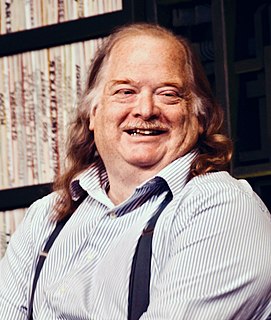A Quote by Michael Pollan
Species co-evolve with the other species they eat, and very often, a relationship of interdependence develops: I'll feed you if you spread around my genes. A gradual process of mutual adaptation transforms something like an apple or a squash into a nutritious and tasty food for a hungry animal.
Related Quotes
Clearly, we are a species that is well connected to other species. Whether or not we evolve from them, we are certainly very closely related to them. A series of mutations could change us into all kinds of intermediate species. Whether or not those intermediate species are provably in the past, they could easily be in our future.
Researchers keep identifying new species, but they have no idea about the life cycle of a given species or its other hosts. They cut open an animal and find a new species. Where did it come from? What effect does it have on its host? What is its next host? They don't know and they don't have time to find out, because there are too many other species waiting to be discovered and described.
It must be stressed that there is nothing insulting about looking at people as animals. We are animals, after all. Homo sapiens is a species of primate, a biological phenomenon dominated by biological rules, like any other species. Human nature is no more than one particular kind of animal nature. Agreed, the human species is an extraordinary animal; but all other species are also extraordinary animals, each in their own way, and the scientific man-watcher can bring many fresh insights to the study of human affairs if he can retain this basic attitude of evolutionary humility.
I think the point of obsession with food means we're healthy as a species. When we're hungry, everything tastes good, hunger is the best spice. When you're in a area that has few resources, you work incredibly hard to have something. And then you make the something taste good. The greatest food in the world comes from the inventiveness of great privation. What emerges is all the miraculous fermentations and all the strong flavors. You put it together in the right way, it's delicious. That defines survival, and our human species.
For a long time, science has gone in the direction of sort of putting people in their place. We learned that the sun doesn't revolve around the Earth, the Earth revolves around the sun; we learned that we're just another species, evolved, like all other species, so we're just another animal, really.
A large animal needs a large area. If you protect that area, you're also protecting thousands of other plants and animals. You're saving all these species that future generations will want - you're saving the world for your children and your children's children. . . . The destruction of species is final. If you lose a species, you lose the genes, you lose all the potential drugs and potential foods that could be useful to the next generations. The ecosystems will not function as they have.
Is he a dread genetic determinist, or a dread environmental determinist? He is neither, of course, for both these species of bogeyman are as mythical as werewolves. By increasing the information we have about the various causes of the constraints that limit our current opportunities, he has increased our powers to avoid what we want to avoid, prevent what we want to prevent. Knowledge of the roles of our genes, and the genes of the other species around us, is not the enemy of human freedom, but one of its best friends.
The human species was given dominion over the earth and took the opportunity to exterminate other species and warm the atmosphere and generally ruin things in its own image, but it paid this price for its privileges: that the finite and specific animal body of this species contained a brain capable of conceiving the infinite and wishing to be infinite itself.
Zoologists have reckoned there are up to at least 750 species of animal that have been observed exhibiting same-sex behaviour, or gender role transformation (which is very common in a wide range of fauna). There is only one species on earth, however, which has exhibited homophobia or transphobia. And that is the species homo sapiens sapiens. Us. So let's not allow the foolish, ignorant or bigoted ever to use words like "natural."
If we recognise that every ecosystem can also be viewed as a food web, we can think of it as a circular, interlacing nexus of plant animal relationships (rather than a stratified pyramid with man at the apex)… Each species, be it a form of bacteria or deer, is knitted together in a network of interdependence, however indirect the links may be.



































